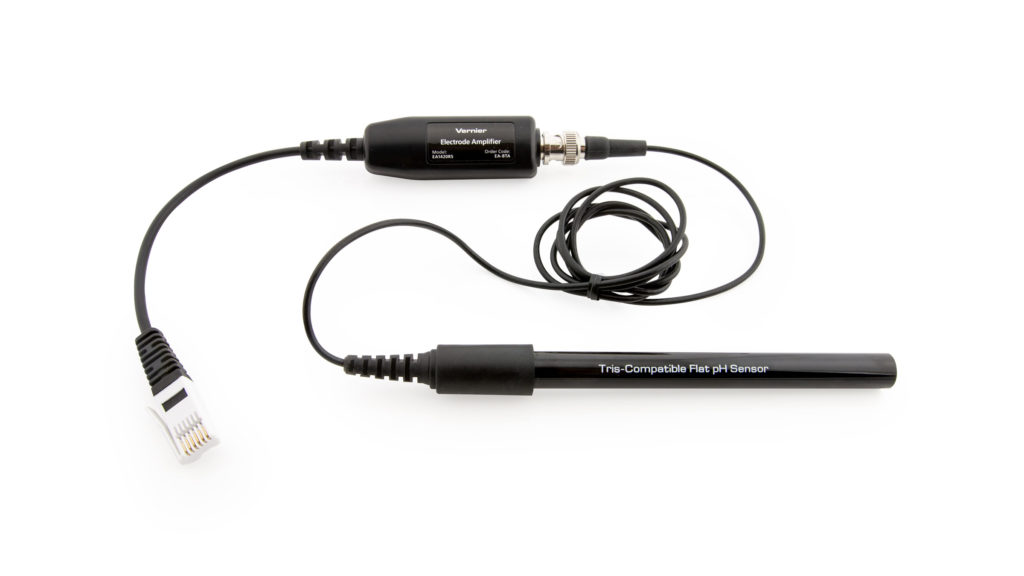Tris-Compatible Flat pH Sensor User Manual
Order Code: FPH-BTA
The Tris-Compatible Flat pH Sensor measures the pH of a solution or semisolid. Because the glass membrane is flat instead of a bulb, it is more durable, easier to clean, and allows for flat surface measurements and smaller sample sizes. It features a sealed, gel-filled, double-junction electrode, making it compatible with Tris buffers and solutions containing proteins or sulfides. The attached Electrode Amplifier stores a custom calibration.
Note: Vernier products are designed for educational use. Our products are not designed nor are they recommended for any industrial, medical, or commercial process such as life support, patient diagnosis, control of a manufacturing process, or industrial testing of any kind.
What's Included
- pH Electrode
- Electrode Amplifier connected via BNC
- Electrode Storage Bottle, containing pH 4/KCl solution
Compatible Software and Interfaces
Choose a platform below to see its compatibility requirements.LabQuest
Interface LabQuest App LabQuest 3 Full support LabQuest 2 Full support LabQuest Full support Computers
Software Interface Graphical Analysis Graphical Analysis (Web App) Logger Pro (discontinued) Logger Lite (discontinued) LabQuest Mini Full support Full support Full support Full support LabQuest 3 Full support Full support Full support Incompatible LabQuest 2 Full support Full support Full support Full support LabQuest Stream Full support 1 Full support 1 Partial support 2 Full support 1 Go!Link Full support Full support Full support Full support LabQuest Full support Full support Full support Full support LabPro Incompatible Incompatible Full support Full support Compatibility Notes
Chromebook
Software Interface Graphical Analysis (Web App) LabQuest Mini Full support LabQuest 3 Full support LabQuest 2 Full support LabQuest Stream Full support 1 Go!Link Full support LabQuest Full support Compatibility Notes
iOS
Software Interface Graphical Analysis Graphical Analysis GW LabQuest Stream Full support Incompatible LabQuest 3 Full support 1 Full support 1 LabQuest 2 Full support 1 Full support 1 Compatibility Notes
Android
Software Interface Graphical Analysis Graphical Analysis GW LabQuest Stream Full support Incompatible LabQuest 3 Full support 1 Full support 1 LabQuest 2 Full support 1 Full support 1 Compatibility Notes
Arduino
Software Interface Arduino Vernier Arduino® Interface Shield Full support LabVIEW
Software Interface NI LabVIEW SensorDAQ Full support Vernier myDAQ Adapter Full support 1 Go!Link Full support LabQuest Mini Full support LabQuest Stream Full support LabQuest 3 Full support LabQuest 2 Full support LabQuest Full support Compatibility Notes
Texas Instruments
Software Interface EasyData DataMate TI-84 SmartView DataQuest TI-Nspire Software EasyLink Full support 1 Incompatible Full support 2 Full support Full support 2 CBL 2 Full support 3 Full support 3 4 Incompatible Incompatible Incompatible LabPro Full support 3 Full support 3 4 Incompatible Incompatible Incompatible TI-Nspire Lab Cradle Incompatible Incompatible Incompatible Full support Full support Compatibility Notes
Getting Started
- Connect the sensor to the interface (LabQuest Mini, LabQuest 3, etc.).
- Start the appropriate data-collection software (Vernier Graphical Analysis®, LabQuest® App, or Logger Pro™) if not already running, and choose New from File menu. The software will identify the sensor and load a default data‑collection setup. You are now ready to collect data.
If you are collecting data using a Chromebook™, mobile device such as iPad® or Android™ tablet, or a Vernier wireless interface, please see the following link for up-to-date connection information:
Using the Product
- Remove the storage bottle from the electrode by unscrewing the lid and removing the bottle and lid.
- Thoroughly rinse the lower section of the probe, especially around the bulb‑shaped tip, using distilled or deionized water.
- Connect the sensor following the steps in the Getting Started section of this user manual.
- When you are finished making measurements, rinse the electrode with distilled water.
- Slide the cap onto the electrode body and then screw the cap onto the storage bottle so the tip of the electrode is immersed in the storage solution.
Important: Do not fully submerge the sensor. The handle is not waterproof.
Do not leave the electrode in acids or bases with concentrations greater than 1.0 M for periods longer than 5 minutes. See www.vernier.com/ph-sensors for other types of pH electrodes.
Calibration
For many experiments, calibrating the Tris-Compatible Flat pH Sensor is not required. A calibration equation is stored on each Tris-Compatible Flat pH Sensor before it is shipped, which is used as a default by Vernier software.
For the most accurate measurements with this sensor, we recommend calibration. It is a simple process that takes only a few minutes.
- For instructions for Tris-Compatible Flat pH Sensor calibration using Logger Pro computer software, see www.vernier.com/til/2341
- For instructions for Tris-Compatible Flat pH Sensor calibration using LabQuest App, see www.vernier.com/til/3394
- For instructions for Tris-Compatible Flat pH Sensor calibration using Graphical Analysis with a Chromebook, see www.vernier.com/til/3631
- For instructions for Tris-Compatible Flat pH Sensor calibration using Graphical Analysis with an iOS or Android device, see www.vernier.com/til/3630
In order to calibrate a Tris-Compatible Flat pH Sensor or to confirm that a saved pH calibration is accurate, you should have a supply of pH buffer solutions that cover the range of the pH values you will be measuring. For more information about pH buffer solutions, including recipes for preparation, see www.vernier.com/til/3625
Specifications
|
Type |
Double-junction, sealed, gel-filled, polycarbonate body, Ag/AgCl |
|
Temperature range |
5 to 80°C (readings not compensated) |
|
Range |
pH 0–14 |
|
Accuracy |
± 0.2 pH units |
|
Isopotential pH |
pH 7 (point at which temperature has no effect) |
|
Default calibration values |
|
|
Shaft diameter |
12 mm OD |
|
Membrane style |
Flat glass |
|
Cable |
1 meter coaxial cable with BNC connector |
Care and Maintenance
Short-term storage (up to 24 hours): Place the electrode in pH 4 or pH 7 buffer solution. It should never be stored in distilled water.
Long-term storage (more than 24 hours): Store the electrode in a pH 4 buffer/KCl storage solution in the storage bottle. The pH electrode is shipped in this solution. Vernier sells 500 mL bottles of pH Storage Solution (order code PH‑SS), or you can prepare additional storage solution by adding 10 g of solid potassium chloride (KCl) to 100 mL of pH 4 buffer solution. Vernier sells a pH Buffer Capsule kit (PH-BUFCAP) that includes a buffer solution preservative. Storing the electrode in this solution contributes to electrode longevity and retains electrode response time when the unit is placed back into service.
If the electrode is inadvertently stored dry for a short period of time, immerse the tip in the pH 4 buffer/KCl storage solution for a minimum of 8 hours prior to use. If the readings are still not accurate after calibration or if the response is slow, try shocking the sensor as described in the Troubleshooting section.
How the Sensor Works
The Tris-Compatible Flat pH Sensor is a sealed, gel-filled, double-junction pH Electrode attached via BNC to our Electrode Amplifier. The double-junction pH Electrode prevents silver from the Ag/AgCl gel from coming in contact with the sample. Tris buffers (tris(hydroxymethyl)aminomethane) and solutions with proteins and sulfides will react with silver to clog the reference junction, shortening the life of single-junction electrodes.
The measurement electrode is made of flat glass, making it more durable and easier to clean than a traditional glass bulb. In addition to liquids, it is ideal for measuring the pH of semisolids such as many foods and soil slurries. It also allows for flat surface measurements and the use of smaller sample sizes.
The Electrode Amplifier that is included with the sensor amplifies the electrode’s mV reading into the appropriate range for the interface. It also provides the software with the calibration values that convert the voltage into a pH value.
Troubleshooting
When testing a Tris-Compatible Flat pH Sensor, it is best to measure a buffer solution because it is easier to determine if the sensor is reading correctly. Do not test your sensor by measuring distilled water. Distilled water can have a pH reading in the range of 5.5–7.0, due to varying amounts of dissolved carbon dioxide. Furthermore, due to a lack of ions, the pH values reported with the sensor in distilled water will be erratic.
If your Tris-Compatible Flat pH Sensor is reading differently from the pH of a buffer solution (e.g., reads 6.7 in a buffer 7), you may simply need to calibrate the sensor. See the Calibration section for more information.
If your readings are off by several pH values, the pH readings do not change when moved from one buffer solution to a buffer solution of different pH, the sensor was stored dry for an extended period of time, or the sensor’s response seems slow, the problem may be more serious. A method called “shocking” can be used to revive pH electrodes. To shock your pH Sensor, perform the following:
- Soak the pH Electrode for 4–8 hours in an HCl solution of 0.1 M–0.5 M.
- Rinse off the electrode and soak the tip in freshly prepared long‑term storage solution (recipe above) for 30–60 minutes.
- Rinse the electrode and test it with buffer solutions of known pH.
Occasionally, mold will grow in the pH 4 buffer/storage solution. Mold will not harm the electrode and can easily be removed using a mild detergent solution. Mold growth in the storage solution can be inhibited by adding a buffer preservative.
For additional troubleshooting and FAQs, see www.vernier.com/til/1361
Repair Information
If you have followed the troubleshooting steps and are still having trouble with your Tris-Compatible Flat pH Sensor, contact Vernier Technical Support at support@vernier.com or call 888-837-6437. Support specialists will work with you to determine if the unit needs to be sent in for repair. At that time, a Return Merchandise Authorization (RMA) number will be issued and instructions will be communicated on how to return the unit for repair.
Accessories/Replacements
| Item | Order Code |
|---|---|
|
PH-SS |
|
|
PH-BUFCAP |
|
|
BTL |
Warranty
Vernier warrants this product to be free from defects in materials and workmanship for a period of five years from the date of shipment to the customer. This warranty does not cover damage to the product caused by abuse or improper use. This warranty covers educational institutions only.
Contact Support
Fill out our online support form or call us toll-free at 1-888-837-6437.

